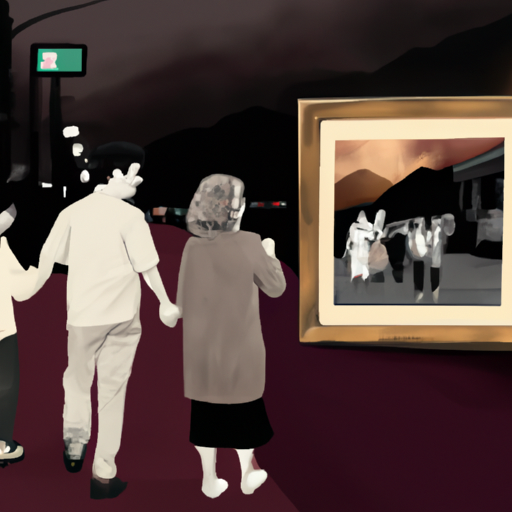The History Of 666 In Chinese Slang
By: By Ancients Past



The History Of 666 In Chinese Slang

Unlock the secrets of and find out its mysterious Chinese slang interpretation! Delve into the enigma and uncover what lies beneath this enigmatic number! Unearth the hidden truths and explore the unknown depths of its connotations! Uncover the truth and unravel the mystery that shrouds this peculiar figure!

A figure shrouded in enigma and trepidation, 666 has long been a source of fascination with its mysterious history. Believed to have originated from an ancient Chinese language, it was used as slang for "things going wrong". In the Bible, it is associated with the Beast of Revelation and symbolizes the Antichrist. More recently, it has become a representation of evil and bad luck. Despite this, some still believe that this number holds some kind of hidden power or meaning. To uncover what lies beneath this enigmatic number, one must delve into its origins to better understand its past.
Tracing back to Babylonian times, 666 was first used to represent Ishtar, the goddess of love and war. Later on in Jewish tradition, it was said to signify King Solomon's seal which provided divine protection against evil forces. In Christianity, 666 is often linked to the Antichrist or Satan himself. This connection has caused many superstitions surrounding this figure such as avoiding certain numbers or activities that may bring bad luck if performed on days containing this number.
Today, 666 continues to captivate people around the world due its enigmatic nature and dark connotations. While some believe that it holds a special power or meaning, others simply view it as an unlucky figure that should be avoided at all costs. Regardless of one's opinion regarding this peculiar figure, there is no denying its unique place in history and its ability to capture our imaginations!
Introduction

In Chinese culture, the number 666 has been known to be linked with fortune and luck for generations. Three sixes making up the number is seen as a sign of good luck in ancient times. However, more recently, this number has taken on a different meaning. During the 1980s, it became popular to refer to someone who was not having much luck or seemed unfortunate as "666". This term has since been used to insult someone who is facing a streak of misfortune.
- Historical Origins of the Chinese Slang Meaning of
The term "history" has been around for centuries, originating in ancient Chinese culture. In the Zhou Dynasty (1046-256 BC), the word "shi" was used to describe something that had happened in the past—a concept that was later adapted and further developed by scholars in the Han Dynasty (206 BC-220 AD) with the term "lushi", meaning records of past events.
It wasn't until the Ming Dynasty (1368-1644) that this idea evolved into a single word encompassing all aspects of knowledge about what had occurred before. This new word was then adopted as a popular way of referring to history in general, and is still widely used today as a reference to historical events, highlighting its importance within Chinese culture and language.
- The Cultural Significance of in Chinese History
Throughout the ages, Chinese culture has been a powerful force that has shaped the world. From its humble agricultural beginnings to its current status as a major global power, Chinese history has been marked by its diverse customs and traditions. Art and literature have been integral parts of this culture since ancient times, with classic texts like The Book of Changes, The Art of War, and Tao Te Ching still being widely studied today. Artwork from this period is also highly prized and can be found in many museums around the world.
Religion is another important aspect of Chinese culture, with Buddhism, Taoism, Confucianism, and other traditional beliefs having been practiced for centuries. These religions have had an immense impact on how people think about life and death, morality and ethics, social roles, and much more.
Food is yet another key element in Chinese culture that has spread all over the world. Popular dishes such as Peking duck, dumplings, congee noodles, dim sum are enjoyed by millions due to their delicious flavors and health benefits; food also plays a major role in festivals like the Spring Festival or Lunar New Year celebration where families come together to savor meals together.
Music is also an important part of Chinese culture that has been passed down through generations. Traditional instruments such as guzhengs (Chinese zithers) are still used today to create beautiful melodies that evoke emotions ranging from joy to sorrow depending on the piece being performed; music can also be used to tell stories or express feelings that words cannot adequately capture.
The cultural significance of China throughout history is undeniable; it has served as an inspiration for countless generations across the globe for centuries now. Its art forms continue to mesmerize audiences today while its religion provides guidance for many who seek it out; its food brings people together from all walks of life; and its music continues to move hearts everywhere it's heard.
- How the Number Came to Represent Evil in Chinese Culture
For ages, the Chinese have been wary of the number 4, but why? Examining history reveals the source of this dread.
The I Ching, an old Chinese work, is one of the earliest references to 4 being a sign of misfortune. It symbolizes lack of balance and harmony, and in Chinese numerology it is pronounced similarly to "death" or "sorrow". This could be a reason for its negative connotations.
Moreover, Emperor Huangdi's passing on the fourth day of a lunar month reinforced this perception. People began avoiding activities on days which had any connection with 4 - like weddings or funerals - as they were considered unlucky.
Finally, Confucianism also had an impact on making 4 an ill-fated figure. According to Confucianism, respect for authority and tradition are fundamental; thus anything that disrupts these two aspects is seen in a bad light. The number 4 can signify disarray and pandemonium due to its ties with death and destruction, so it was avoided at all costs.
To sum up, there are several historical factors that explain why 4 has become such an ominous number in Chinese culture. Its link with death and destruction in ancient texts, Emperor Huangdi's death on the fourth day of a lunar month, and its disruption of Confucian principles all contributed to this superstition over time.
- Examining the Symbolic Meaning of in Ancient Chinese Texts
Mystifying and perplexing, the ancient Chinese texts have been known to house symbols of immense symbolic meaning. From the dawn of time to the present day, these symbols have been used to represent ideas and notions that are greatly valued in Chinese culture. Examining these symbols can offer us a glimpse into the beliefs, values, and outlooks of those who wrote them. By exploring how they were employed in various settings, we can gain a deeper insight into how they were perceived by the authors and their audience. Dragons, birds, and numbers all hold specific meanings in Chinese culture that can be investigated for an enhanced understanding of this ancient civilization's history.
- Exploring How Beliefs About Have Changed Over Time in Chinese Culture
The long and ever-evolving history of Chinese culture has seen a multitude of beliefs come and go, some of which have been around for centuries. Confucianism, with its focus on respect for elders, filial piety and the value of education, was once the dominant philosophy, promoting strong family values and marriage as a rite of passage. Yet in more recent times, this traditional outlook has been challenged by newer ideas such as Taoism and Buddhism, introducing alternate beliefs concerning the afterlife and spiritual practices.
The twentieth century saw a shift away from traditional religious customs as China modernized. Secular views began to take hold while other religions such as Christianity or Islam gained traction. This trend was further reinforced by the Communist government's promotion of atheism during the Cultural Revolution.
Today's Chinese beliefs are incredibly diverse and rapidly changing in response to social progress. While many rural areas still cling to their old ways, cities have become much more secularized with fewer people adhering to any particular religion or belief system. Different lifestyles are now accepted too, including same-sex marriage which would have been unthinkable just a few generations ago.
It is clear that Chinese beliefs have gone through dramatic changes over time due to external influences as well as internal developments within China itself. As society continues to evolve it is likely that these changes will only accelerate into the future.

conclusion
What exactly is the source of this peculiar expression? It's hard to pinpoint precisely, but it has been a sign of luck and prosperity since the 1800s. Nowadays, it's a widely accepted way to express approval or admiration for something.
Some questions with answers
Q1: What is the history of 666 in Chinese slang?
A1: The number 666 has been used as a slang term in China since the early 20th century. It was originally used to refer to something that was too expensive or overpriced, and later evolved to mean something that was fake or of low quality.
Q2: How did the term become popular?
A2: The term became popularized in the 1980s when it was used by some people as an insult. It has since been widely adopted into everyday language.
Q3: Are there any other interpretations of 666?
A3: In some parts of China, 666 can also be interpreted as "things will turn out okay". This interpretation is based on its pronunciation in Mandarin, which sounds similar to "liu liu liu", meaning "everything will be alright".
Q4: Is 666 considered offensive?
A4: Generally speaking, no. However, it can be considered offensive if used with malicious intent or directed at someone in a derogatory manner.
Q5: Is 666 still commonly used today?
A5: Yes, it is still commonly used among younger generations in China today.
The administrator of this group reserves the right, along with the site moderators, to moderate all and any postings to this group, including the right to enforce the ToS, the CoC, and also including anything that the administrator deems within his sole discretion to be offensive, including and not limited to off topic or 'no value' comments, with the power to delete in exercising those rights.
It would be best, therefore, to be civil in posting on this group.
By now it should be well known that I am unable to open certain sources, videos and pictures. If I cannot, I will ask that they be described and explained. If the poster refuses to comply, their comment will be deleted. Instagrams are banned.







The number 666 was referred to in comment on my article about the Canadian government banning certain times of guns, and I wasn't aware of it having some significance, This article explains it
Remember the movie with Gregory Peck, The Omen ?
Although I may have watched it almost half a century ago, I just don't remember it - but the name "Damien" rings a bell.
That reminds me of when I was in Italy, oh a few decades back, and six of my buddies as well as myself, were all damn tuned up on Nov. 1st, All Saints Day, in Insbruck Austria, and all seven of US were on Acid, left over from our previous destination point, Amsterdamit. We had not a clue 11/1 or All Saints Day was like a Holiday here in Insbruck. So here we are, in a beatiful picturesque setting, up on a large hill, surrounded by other large hills, plush green valleys with a hint of reddish brown tint tainting the leaves approaching optimus primed Fall Foilage about to peak, with te towns bells alla ringin, some town folk, native language a aha a singin, about to peak,like us {and NO, they did not} on ACID, as in all seven of US are hanging on at the top of this large hill, listening to the chiming bells from hells gates, on a mini mountain, with a cool sounding small water fall like fountain, becoming quite parched, as we had run out of BEER, up on that bell rung slippery slope and there was no place to acquire more, around there or hear.... due to the celebration of All Saints Day and as i did say, wee were completely unaware this was a Holiday here, but we needed BEER, and whence you are on Ttrippin Man Hill on ACID, trippin your Face Off like in a Hockey Game and all High, stickin, it to every non English speakin Jr Scwartzennager wanna bee's that weren't sure if we were for real, cause we werre oUT of our flippin minds, but we didn't', mind' that is, or feel inclined to not sit except to take a whiz, for we stood,for sum tin ore udder, and were not given a stand, to receive a standing ovation whilst we were on vacation trippin our ballz off, on trippin man hill, on a beatiful Nov. the first and last day we would spend on Trippin Man Hill with a burning thirst for more Biers, as we were the masters of all we purveyed over as the townsfolk and touristas as well, so as we impatiently waited into the murkey quaint little folksey Insbrook Austria Town, a laughing family caught my eye, as well as the iiiiiz of others, who were on a stroll wandering through the Hills, like that Sound of Music Bitch, Julie Andrews, cause the hills DO come alive to the sound of music when your on Acid, Trippin your face off, when all of a sudden, this family walks past US with a handicapped probably around 20 year old male son, and a priest, who we summized probably .got nun and he was not looking like he was having any fun, for his body was justr that, as it appeared he had no arms with hands, but it was clear, he was in decent shape, as evidence of a possible formeer athlete did show, so oui' tried to be polite, probably the first time in a week of night, for we didn't want anymore to fight, but tough to reason when mind ain't yet done a sneezin your brains out, as we floated on by, then smoked again, and again got high, and as we waited for that six o'clock o18 hundred hour so as our thirst couldthen be a quenched , we suddenly heard a chorus of sirens ringin on the and through the hills, with lights a flashin and all full of fashion.
So we were curious as to what could have happened, and thats when we saw the Father, who had accompanied the handicapped young adult boy, from earlier, and he was lookin under blood atained sheetz, and lookin all crazy eyed when suddenly the Policia grabbed the priest, we thought that maybe the father had a grabbed a little piece, butknow they needed him to identify a sheet draped body. S\o the Priest went in and the Polici questioned his for a good dozen minute straight,as not gay,and the only thing I could hear that priest say after I heard the police plea, please, who is this boy/young man Father, we got to tell his family but we know not who he is or was, besides, we were a Buzzed, and then suddenly , in broken Austrian Arnold language, we heard the Priest say, Yes, yes I met him earlier today and not before so i know not his name or iif, he was all there, besides the arms and hands that had been missin a b 4 and a bit impure and unshore about the young man lying under that sheet, and then suddenly, with great enthusiasm we here the Father ROAR, I never did catch his full name as he only mumbled and did not speak sign, so he explained as day to the offier, I really wishj to help u, i realkky do, but I know not his name, but i do think his face rings a/the bells that we had heard all afternoon, so we ran through t he town high tailin and such, and barely escaped our trip on a trip, as it was an automatic clutch situation we were placed inn, never to go back yet again. n though (97 % of this recalkled story is true, exceot for the part about the young mans face ringin a bell, as we had already named himBob from when we encountered him earlier, but we werent shore that would float either now, so only thing made up now was the Priest and the Altered boy, walk into a bar,,,,ah no, thats not it, hell shit, i gotta go, where thje HELL does the time go, it's almost 6:66 agin, i'll hav eyou know....
WOW. Have you ever tried to get your stories published? I have to tell you that I could comprehend what you wrote not only because as far as the medication and its effects go I've been there, but also because I know there are authors who have succeeded in stream-of-consciousness style.
nah Buz, can't say I have, but there are a few that have asked me to, but Ihavnt as of yet, for i just write to vent